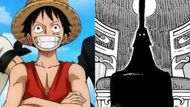Fans of One Piece who have been reading the manga are aware of how much lore Oda has been revealing. Now, with Chapter 1163, we were shown how Imu used his Domi Reversi technique and changed the course of God Valley. With this power being used, fans have come up with an interesting theory: What if Domi Reversi can only work in a person’s homeland?
This might sound like an absurd idea, but if we look at the story in One Piece tends to always connect its plot to its themes of freedom, identity, and the meaning of home. This article will focus on why this “homeland restriction” theory could explain centuries of hidden history.
According to popular theory threads circulating on Piratefolk and X (formerly Twitter), Imu’s Domi Reversi in One Piece can only activate when a target is in their homeland, the place where they were born, where their spirit belongs, or where their lineage roots are strongest.
“Domi” literally translates from Latin as “home” or “of the house,” and “Reversi” means “I have returned.” So together, Domi Reversi could mean “Return to your homeland,” or metaphorically, “Return to your origin.”

That subtle linguistic clue may not be random. Fans believe Imu used Domi Reversi on Rocks D. Xebec during the God Valley Incident, but only because Rocks had made God Valley his base of operations, essentially his new homeland. That could explain why the Rocks Pirates vanished completely after that battle.
If Domi Reversi works by flipping a person’s will, then Imu might have used the island itself to trap and “reverse” Rocks from within his own domain. It would also explain why Imu lured him there in the first place. By bringing Rocks back to a location tied to him spiritually or symbolically, Imu could ensure the ability would work.
Fans have even noticed a pattern: Every known or hinted use of Domi Reversi, from the Elbaph incident in One Piece involving the giants to God Valley, happened on the victim’s native soil.
Thematic perfection in One Piece’s world

Beyond the power mechanics, this theory works on a deeper level. One Piece has always been about how people define “home.” For some, it is a place. For others, it is a dream. Imu’s Domi Reversi might symbolize the dark side of that concept, a power that weaponizes attachment and identity.
By tying control to one’s homeland, Imu becomes the embodiment of stagnation, the opposite of Luffy’s boundless freedom. So if Domi Reversi truly depends on a homeland, it means the greatest act of rebellion in One Piece isn’t just fighting Imu, it is leaving home. It’s becoming a pirate, defying borders, and living by one’s own will.
Whether or not this theory turns out to be canon, it transforms Domi Reversi from a random overpowered ability into something deeply symbolic, a reflection of everything One Piece stands for: Freedom versus control, the sea versus the land, and home versus the world. And in that battle, Luffy, the man with no fixed home, might already be the one Imu can never reverse.
Final thoughts
If this theory turns out to be true, then it makes sense as to why Imu fears pirates so much; they are rootless by nature, constantly moving, and beyond the reach of homeland-based domination.
And maybe Luffy might be the only character strong enough to stand against someone like Imu, as both of them seem to be fated enemies. Finally, if Domi Reversi truly only works when someone’s identity is tied to a specific place, then Luffy might be the one person Imu cannot control.
